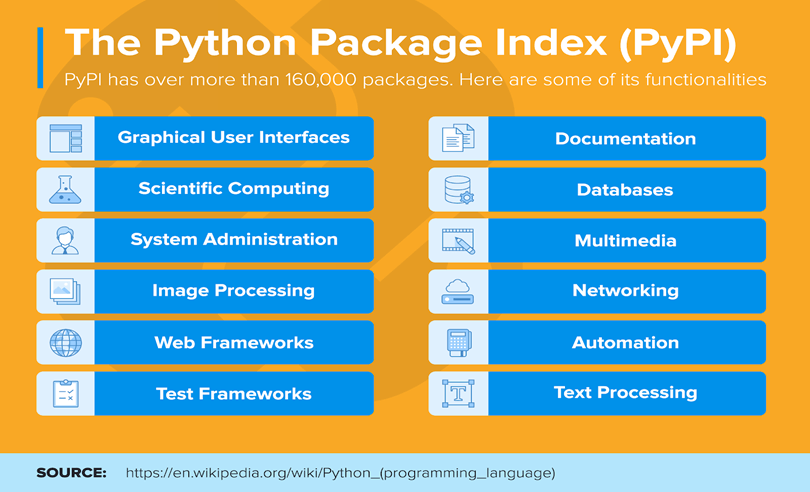
Hello everyone. I'm Danny. Today, we're going to explore the reasons why learning Python is essential. Python offers powerful features while having an easy-to-understand syntax and structure, making it easier to implement and learn compared to other programming languages. Through this lecture, I hope to foster your attachment to Python and ignite a strong desire within you to learn it. Let's begin the lecture.
*As of April 2023, here is the programming language ranking:

▶ There are several compelling reasons to learn Python
In the world of programming languages, just like in spoken languages such as Korean, English, and Chinese, there is a wide variety of options. In the computer world, we have programming languages such as Python, C, Java, C++, C#, and many more, with new languages continuously emerging. According to my findings, there are over 700 programming languages in existence. Among them, as of April 2023, Python holds the top position in the TIOBE index, which measures programming language popularity.
1. Indeed, Python's syntax and grammar are designed to be straightforward and easy to understand.
This design philosophy, often referred to as "readability counts," prioritizes code readability and simplicity. Python avoids complex syntax and enforces indentation-based structure, making it easier for developers to write clean and concise code. The use of meaningful English-like keywords and a minimalistic approach to syntax contributes to Python's reputation for being beginner-friendly and accessible to programmers of all skill levels. Whether you are a beginner or an experienced developer, Python's easy-to-understand syntax allows you to focus more on problem-solving and logic rather than getting caught up in intricate language mechanics.
2. Python provides a vast and powerful library ecosystem.

If you are proficient in Python, you can leverage the wide range of available libraries to satisfy your needs. There are numerous powerful libraries already developed that cater to various domains.
For instance, if you want to create a social networking site, you can use the Django web framework. It provides the necessary tools and functionalities for web development, making it easier to build complex applications.
Moreover, there are libraries available for diverse fields such as Natural Language Processing (NLP), Artificial Intelligence (AI), and Databases. These libraries offer pre-built functions and algorithms, enabling you to perform tasks like text analysis, machine learning, and database management efficiently.
Some notable libraries in Python include NLTK (Natural Language Toolkit) for NLP, TensorFlow and PyTorch for AI and machine learning, and SQLAlchemy for working with databases.
By leveraging these libraries, you can save time and effort in implementing complex functionalities from scratch and focus more on the core logic of your projects. Python's extensive library ecosystem is one of its major strengths, making it a versatile and powerful language for various applications.
3. Python's versatility and wide range of libraries make it suitable for various fields and applications.

Python has gained significant popularity among programmers and is widely used by many sought-after companies. These companies leverage Python for a variety of projects and applications.
Google, for example, has been using Python since its early days and Python played a crucial role in Google's growth. Guido van Rossum, the creator of Python, himself worked at Google, along with other notable companies like Dropbox and Microsoft. The ease of use and faster development speed offered by Python were key factors in its adoption by these companies.
Instagram, one of the most popular social media platforms, is developed using Django, a Python-based web framework. Spotify, a leading music streaming service, also utilizes Python for data analysis and backend service development. The fast development cycle facilitated by Python is a significant advantage for these companies.
It's not just large enterprises but also startups that are embracing Python for their diverse projects. The versatility, simplicity, and extensive library support of Python make it an attractive choice for startups looking to quickly prototype and develop their ideas.
Overall, Python's wide range of applications, its developer-friendly nature, and the support from major companies have contributed to its growing popularity in the industry. Learning Python opens up opportunities to work on exciting projects and be part of a thriving community of developers.
4. Python is an open-source programming language, which means it is freely available to everyone and can be used without any restrictions.
| Open Source? Open Source refers to a software development approach where the copyright holder makes the source code freely available, allowing anyone to use, copy, distribute, and modify the software without any significant restrictions. |
Indeed, Python is open source and freely available to download and use without any licensing fees. It can be obtained from the official Python website, and users can freely install and use Python on their desired platforms without any restrictions or payment requirements.
▶ Python is a versatile programming language that can be used for a wide range of tasks and applications

Python is indeed the programming language with the widest user base. It is used by a diverse range of professionals, including university students, working professionals, data scientists, mathematicians, researchers, teachers, and more. The versatility of Python allows users from various occupations to accomplish a wide range of tasks. Some of the key domains where Python is used include:
▷ Data Science: Python is widely used in data analysis, data visualization, and machine learning tasks. Libraries such as Pandas, NumPy, and scikit-learn provide powerful tools for data manipulation, analysis, and modeling.
▷ Web and Mobile Application Development: Python frameworks like Django and Flask enable developers to build robust web applications and APIs. Additionally, Python can be used for mobile app development using frameworks like Kivy and BeeWare.
▷ Cloud Computing: Python has libraries and frameworks that facilitate cloud computing tasks, such as interacting with cloud platforms (e.g., AWS, Google Cloud) and building scalable applications.
▷ Artificial Intelligence and Machine Learning: Python's simplicity and rich ecosystem make it a popular choice for developing AI and ML applications. Libraries like TensorFlow and PyTorch provide powerful tools for building and training neural networks.
▷ Automation and Robotics: Python's ease of use and extensive libraries make it ideal for automation tasks, including scripting, task scheduling, and control of robotic systems.
▷ Game Development: Python has libraries like Pygame that enable the creation of 2D games. It is also used for game scripting and development in popular game engines like Unity.
Thank you for reading this introduction to Python. In the next session, we will proceed with the installation of Python. See you in the next class!
'Python lessons for English speakers > Lessons for beginners' 카테고리의 다른 글
| [Python Self-Study] 1.1 What is Python? (0) | 2023.05.22 |
|---|